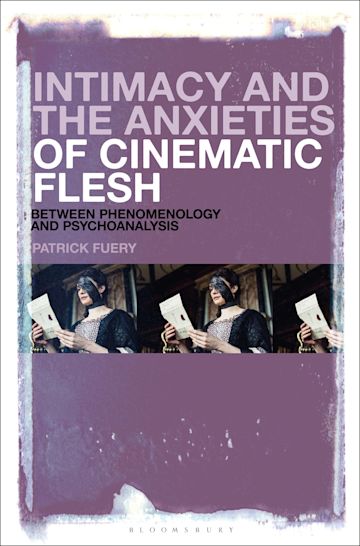
Intimacy and the Anxieties of Cinematic Flesh: Between Phenomenology and Psychoanalysis Faculty Books
February 21, 2023
Dr. Patrick Fuery (Professor and Director of the Center for Creative and Cultural Industries) recently published his 9th book, Intimacy and the Anxieties of Cinematic Flesh: Between Phenomenology and Psychoanalysis (Bloomsbury, 2023).
“This was a book I have wanted to write for some time,” said Dr. Fuery. “All my previous books have looked at different ideas from Continental philosophy. Two of the great philosophical movements of the 20th and 21st centuries are phenomenology and psychoanalysis. The general view is that they are so fundamentally distinct that they cannot be brought together. This book looks at how this might be done.”
Dr. Fuery describes both movements being immense in history and scope which made it a challenge managing the complex ideas. He focused on two “themes” – intimacy and anxiety – and cinema. The book begins with the idea that whenever we enter into an intimate relationship we have a corresponding “attachment” to anxiety.
 “I adapted an idea from Freud: Wo Es war, soll Ich werden (where it was, there ego shall be) to read ‘where intimacy was, there anxiety shall be’. From this, the book explores the idea of the intimate spectator of a film wrapped in anxiety. Although film is the example, the ideas work equally well for all art forms, such as paintings, literature, theater, even gaming,” he said.
“I adapted an idea from Freud: Wo Es war, soll Ich werden (where it was, there ego shall be) to read ‘where intimacy was, there anxiety shall be’. From this, the book explores the idea of the intimate spectator of a film wrapped in anxiety. Although film is the example, the ideas work equally well for all art forms, such as paintings, literature, theater, even gaming,” he said.
Dr. Fuery hopes his book opens up the idea of combining phenomenology and psychoanalysis as ways of understanding the other as well as analysis of how we watch a film, read a novel or view a painting.
“I also hope it gives a better understanding of intimacy and anxiety as complex systems of thinking and acting,” he said.
Described as a “challenging pleasure to write” he still feels that there is more to do on this project of bringing psychoanalysis and phenomenology together. While presenting his findings at international conferences he learned that researchers in both fields are open to this approach.
“I have also been pleasantly surprised to see how receptive students are to such complex material. CCI students don’t tend to be philosophically or psychoanalytically minded, but they embraced the material in a really positive way. Some of the ideas found their way into my classes last semester (on Experiencing CCI and Content Creation – when we built the dream machine). It reminded me that our students will engage with complexity if we find the right way to do it.”
Dr. Fuery has already started writing another book that will explore how dreams are more than what takes place at night and are related to cultural systems.
We look forward to hearing what he discovers.

